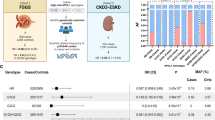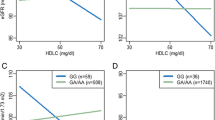Abstract
Background
Two coding variants—G1 and G2—in the apolipoprotein L-1 (APOL1) gene are associated with increased incidence of end-stage renal disease (ESRD) in the adult African American population. These variants associate with hypertension-attributed renal disease, focal segmental glomerulosclerosis (FSGS), and HIV-associated nephropathy. We hypothesized that as a genetic disease, APOL1 nephropathy has a pediatric phenotype.
Methods
We investigated the incidence of APOL1 variants in young African Americans with hypertension or FSGS and a family history of ESRD by conducting a case–control study of 93 pediatric and young adult African Americans with hypertension or FSGS to determine the association with APOL1 risk variants, G1, and G2 using custom-made TaqMan-based allelic discrimination assays.
Results
Forty of the 61 cases (66 %) with a family history of kidney disease had two APOL1 risk variants, significantly higher than the prevalence in controls and the general African American population (p < 0.001); 24 of 29 patients with hypertension-attributed kidney disease had two APOL1 risk variants, while none of nine hypertensive patients without kidney disease had more than one risk allele.
Conclusions
Although it was a small study cohort, our findings strongly suggest for the first time that two APOL1 risk alleles in young hypertensive African Americans with a family history of ESRD are strongly associated with kidney disease.

Similar content being viewed by others
References
Coresh J, Byrd-Holt D, Astor BC, Briggs JP, Eggers PW, Lacher DA, Hostetter TH (2005) Chronic kidney disease awareness, prevalence, and trends among U.S. adults, 1999 to 2000. J Am Soc Nephrol 16:180–188
Collins AJ, Foley RN, Herzog C, Chavers B, Gilbertson D, Herzog C, Ishani A, Johansen K, Kasiske B, Kutner N, Liu J, St. Peter W, Ding S, Guo H, Kats A, Lamb K, Li S, Li S, Roberts T, Skeans M, Snyder J, Solid C, Thompson B, Weinhandl E, Xiong H, Yusuf A, Zaun D, Arko C, Chen S-C, Daniels F, Ebben J, Frazier E, Hanzlik C, Johnson R, Sheets D, Wang X, Forrest B, Constantini E, Everson S, Eggers P, Agodoa L (2013) US Renal Data System 2012 annual data report. Am J Kidney Dis 61:A7
Parsa A, Kao WHL, Xie D, Astor BC, Li M, Hsu C-Y, Feldman HI, Parekh RS, Kusek JW, Greene TH, Fink JC, Anderson AH, Choi MJ, Wright JT, Lash JP, Freedman BI, Ojo A, Winkler CA, Raj DS, Kopp JB, He J, Jensvold NG, Tao K, Lipkowitz MS, Appel LJ (2013) APOL1 risk variants, race, and progression of chronic kidney disease. N Engl J Med 369:2183–2196
Kopp JB, Nelson GW, Sampath K, Johnson RC, Genovese G, An P, Friedman D, Briggs W, Dart R, Korbet S, Mokrzycki MH, Kimmel PL, Limou S, Ahuja TS, Berns JS, Fryc J, Simon EE, Smith MC, Trachtman H, Michel DM, Schelling JR, Vlahov D, Pollak M, Winkler CA (2011) APOL1 genetic variants in focal segmental glomerulosclerosis and HIV-associated nephropathy. J Am Soc Nephrol 22:2129–2137
Freedman B, Murea M (2012) Target organ damage in African American hypertension: role of APOL1. Curr Hypertens Rep 14:21–28
Freedman BI, Langefeld CD, Andringa KK, Croker JA, Williams AH, Garner NE, Birmingham DJ, Hebert LA, Hicks PJ, Segal MS, Edberg JC, Brown EE, Alarcón GS, Costenbader KH, Comeau ME, Criswell LA, Harley JB, James JA, Kamen DL, Lim SS, Merrill JT, Sivils KL, Niewold TB, Patel NM, Petri M, Ramsey-Goldman R, Reveille JD, Salmon JE, Tsao BP, Gibson KL, Byers JR, Vinnikova AK, Lea JP, Julian BA, Kimberly RP, on behalf of the Lupus Nephritis–End-Stage Renal Disease C (2014) End-stage renal disease in African Americans with lupus nephritis is associated with APOL1. Arthritis Rheumatol 66:390–396
Lin CP, Adrianto I, Lessard CJ, Kelly JA, Kaufman KM, Guthridge JM, Freedman BI, Anaya JM, Alarcon-Riquelme ME, Pons-Estel BA, Martin J, Glenn S, Adler A, Bae SC, Park SY, Bang SY, Song YW, Boackle SA, Brown EE, Edberg JC, Alarcon GS, Petri MA, Criswell LA, Ramsey-Goldman R, Reveille JD, Vila LM, Gilkeson GS, Kamen DL, Ziegler J, Jacob CO, Rasmussen A, James JA, Kimberly RP, Merrill JT, Niewold TB, Scofield RH, Stevens AM, Tsao BP, Vyse TJ, Langefeld CD, Moser KL, Harley JB, Gaffney PM, Montgomery CG (2012) Role of MYH9 and APOL1 in African and nonAfrican populations with lupus nephritis. Genes Immun 13:232–238
Papeta N, Kiryluk K, Patel A, Sterken R, Kacak N, Snyder HJ, Imus PH, Mhatre AN, Lawani AK, Julian BA, Wyatt RJ, Novak J, Wyatt CM, Ross MJ, Winston JA, Klotman ME, Cohen DJ, Appel GB, D’Agati VD, Klotman PE, Gharavi AG (2011) APOL1 variants increase risk for FSGS and HIVAN but not IgA nephropathy. J Am Soc Nephrol 22:1991–1996
Ashley-Koch AE, Okocha EC, Garrett ME, Soldano K, De Castro LM, Jonassaint JC, Orringer EP, Eckman JR, Telen MJ (2011) MYH9 and APOL1 are both associated with sickle cell disease nephropathy. Br J Haematol 155:386–394
Hicks PJ, Langefeld CD, Lu L, Bleyer AJ, Divers J, Nachman PH, Derebail VK, Bowden DW, Freedman BI (2011) Sickle cell trait is not independently associated with susceptibility to end-stage renal disease in African Americans. Kidney Int 80:1339–1343
Kanji Z, Powe CE, Wenger JB, Huang C, Ankers E, Sullivan DA, Collerone G, Powe NR, Tonelli M, Bhan I, Bernhardy AJ, DiBartolo S, Friedman D, Genovese G, Pollak MR, Thadhani R (2011) Genetic variation in APOL1 associates with younger age at hemodialysis initiation. J Am Soc Nephrol 22:2091–2097
Genovese G, Friedman DJ, Ross MD, Lecordier L, Uzureau P, Freedman BI, Bowden DW, Langefeld CD, Oleksyk TK, Uscinski Knob AL, Bernhardy AJ, Hicks PJ, Nelson GW, Vanhollebeke B, Winkler CA, Kopp JB, Pays E, Pollak MR (2010) Association of trypanolytic ApoL1 variants with kidney disease in African Americans. Science 329:841–845
Foster MC, Coresh J, Fornage M, Astor BC, Grams M, Franceschini N, Boerwinkle E, Parekh RS, Kao WHL (2013) APOL1 variants associate with increased risk of CKD among African Americans. J Am Soc Nephrol 24:2585–2591
Tzur S, Rosset S, Shemer R, Yudkovsky G, Selig S, Tarekegn A, Bekele E, Bradman N, Wasser W, Behar D, Skorecki K (2010) Missense mutations in the APOL1 gene are highly associated with end stage kidney disease risk previously attributed to the MYH9 gene. Hum Genet 128:345–350
Freedman BI, Langefeld CD, Turner J, Nunez M, High KP, Spainhour M, Hicks PJ, Bowden DW, Reeves-Daniel AM, Murea M, Rocco MV, Divers J (2012) Association of APOL1 variants with mild kidney disease in the first-degree relatives of African American patients with nondiabetic end-stage renal disease. Kidney Int 82:805–811
Lipkowitz MS, Freedman BI, Langefeld CD, Comeau ME, Bowden DW, Kao WHL, Astor BC, Bottinger EP, Iyengar SK, Klotman PE, Freedman RG, Zhang W, Parekh RS, Choi MJ, Nelson GW, Winkler CA, Kopp JB (2013) Apolipoprotein L1 gene variants associate with hypertension-attributed nephropathy and the rate of kidney function decline in African Americans. Kidney Int 83:114–120
Ferguson R, Grim CE, Opgenorth TJ (1988) A familail risk of chronic renal failure among blacks on dialysis. J Clin Epidemiol 41:1189–1196
Freedman BI, Tuttle AB, Spray BJ (1995) Familial predisposition to nephropathy in African-Americans with noninsulin-dependent diabetes mellitus. Am J Kidney Dis 25:710–713
Freedman BI, Spray BJ, Tuttle AB, Buckalew VM Jr (1993) The familial risk of end-stage renal disease in African-Americans. Am J Kidney Dis 21:387–393
Bergman S, Key BO, Kirk KA, Warnock DG, Rostant SG (1996) Kidney disease in the first-degree relatives of African-Americans with hypertensive end-stage renal disease. Am J Kidney Dis 27:341–346
Whittle JC, Whelton PK, Seidler AJ, Klag MJ (1991) Does racial variation in risk factors explain black-white differences in the incidence of hypertensive end-stage renal disease? Arch Intern Med 151:1359–1364
Ko W-Y, Rajan P, Gomez F, Scheinfeldt L, An P, Winkler CA, Froment A, Nyambo Thomas B, Omar Sabah A, Wambebe C, Ranciaro A, Hirbo Jibril B, Tishkoff Sarah A (2013) Identifying Darwinian selection acting on different human APOL1 variants among diverse African populations. Am J Hum Genet 93:54–66
Acknowledgments
We acknowledge the assistance of Mary Hoffmann, clinical research coordinator, Kidney Translational Research Core (KTRC), Washington University School of Medicine, Masato Hoshi: Senior Scientist, Jain Lab, Washington University School of Medicine, and Jie Zheng Division of Biostatistics, Washington University School of Medicine.
Sources of support
This work was supported by a Genzyme (Sanofi) fellowship grant (EA), the National Institutes of Health (NIH) George M. O’Brien Center for Kidney Disease Research (P30-DK079333), and CTSA-ICTS Tissue Procurement and Molecular Phenotyping and Center for Biomedical Informatics Cores (NCRR UL1 RR024992) to Washington University, Children Discovery Institute grants MDII2009177 (S.J.).
Disclosures
None.
Author information
Authors and Affiliations
Corresponding authors
Rights and permissions
About this article
Cite this article
Anyaegbu, E.I., Shaw, A.S., Hruska, K.A. et al. Clinical phenotype of APOL1 nephropathy in young relatives of patients with end-stage renal disease. Pediatr Nephrol 30, 983–989 (2015). https://doi.org/10.1007/s00467-014-3031-0
Received:
Revised:
Accepted:
Published:
Issue Date:
DOI: https://doi.org/10.1007/s00467-014-3031-0




